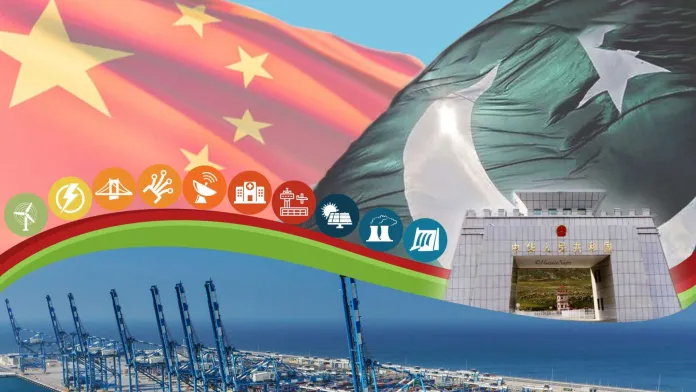Menu
The China's Global Security Initiative and China-Pakistan Cooperation:
A New Paradigm of Global Governance
By Adnan Hameed | Published September 01, 2024
Introduction In today's shrinking yet increasingly complex world, the pursuit of global peace and security remains paramount among nations. Recently, the Government of China has proposed the Global Security Initiative, or GSI-a comprehensive framework that addresses the concerns of multilateralism, cooperative security, and sustainable development. This article examines the GSI and implications for global governance, using the China-Pakistan partnership as a model to implement these principles. The Global Security Initiative: A Blueprint for Peace The Global Security Initiative, articulated in Xi Jinping's governance philosophy, for the first time elaborates on the generational shift in China's approach to international relations. At the core of GSI is a belief that security is a universal right: all countries, big or small, are equal, and all are entitled to pursue their national interests without fear of aggression. Underlined in this initiative also is reliance on dialogue and cooperation and the avoidance of zero-sum games in international politics.

Photo by: Ambassador Naghmana Hashmi from Stratheia
Fundamentally, the GSI rests on the following six pillars: 1. Mutual Respect: Nations should respect each other's sovereignty and territorial integrity, cultural diversity, and development paths. The emphasis here is that hegemonism should be abandoned for the establishment of a multipolar world order. 2. Openness and Inclusiveness: Global security should not be left to a few but should be broad-based, involving all nations. In inclusiveness lies trust and collective action-ingredients so essential in meeting the challenges of a rapidly changing world. 3. Comprehensive Security: Such security will need to be comprehensive in scope-since new threats like terrorism, climate change, and pandemics have supplemented traditional ones. 4. Common and Cooperative Security: Security should be pursued through dialogue and cooperation and not through confrontation or alliances with a view to containing others. 5. Sustainable Security: Stability can only be lasting with development, poverty reduction, and addressing the causes of conflict. 6. People-Centered Security: The security of the people is paramount; policies and initiatives must concretely benefit citizens. These principles reflect China's broader vision for a global community with a shared future, as articulated in Xi Jinping's comprehensive work, The Governance of China. The GSI naturally flows from China's path of peaceful development to promote its own vision for global security, which originates in China's belief in fairness, justice, and mutual benefit. China-Pakistan Cooperation: A Pillar of the Global Security Initiative In essence, the China-Pakistan relationship embodies the spirit of an "all-weather" relationship-that is what GSI essentially stands for. It has been built into a cornerstone for regional stability not only in South Asia but beyond, on the basis of mutual respect, shared interests, and deep-rooted trust in this strategic partnership. Mutual Respect and Sovereignty: For a long time, China and Pakistan have supported each other with the principle of respecting each other's sovereignty and territorial integrity. Such mutual respect acts as a stabilizer in this often geopolitically tense region. The CPEC, an imperative project under the BRI of China, is a paradigmatic example of this spirit of cooperation between the two nations. The CPEC is more than an economic corridor but has grown into a symbol of both countries' pledges for common development and shared prosperity.
Inclusive and Cooperative Security: The security dimension of China-Pakistan cooperation is no less dynamic. On every issue in the realm of security, the two countries have always stood by each other. China has supported Pakistan's stand at international gatherings on Kashmir, while on issues pertaining to Xinjiang, Hong Kong, and Taiwan, Pakistan has reciprocated for China. Strategic support from both sides reflects what will be the look of cooperative security as envisioned by the GSI. Aside from that, both countries developed and increased security cooperation on non-traditional threats such as terrorism and transnational crimes. These are demonstrated in joint military exercises, intelligence sharing, and coordinated efforts in counter-terrorism operations. These again fall in line with the GSI call for comprehensive, cooperative security on all levels of traditional and emerging threats. Sustainable Development and Security: GSI makes it a point to note that security and development go hand in glove. In this regard, too, the China-Pakistan partnership serves as a role model. CPEC has emerged as one of the key drivers for infrastructure, energy, and industrial sectors in Pakistan, apart from being key contributors to economic growth and social stability in the country. As a matter of fact, targeting development, China and Pakistan are delving deep into eradicating the very reasons for this insecurity: things like poverty and unemployment. Moreover, both countries are making collective efforts to accomplish the SDGs, and CPEC projects are designed and executed on the grounds of environmental and social sustainability. Doing so will ensure that development will take place rapidly but be sustainable, thus upholding GSI's principle of security sustainability. People-Centered Security: Another most important characteristic of the GSI is the centrality of people-centred security. It has practically materialized within the China-Pakistan relationship on various levels of initiatives aimed at improving the lives of the general public. Examples include direct participation of China in the health and education sectors and infrastructure of Pakistan for upliftment of the people of Pakistan. These are further bolstered by cultural exchanges, scholarships, and capacity-building programs, which add to mutual understanding and goodwill between the two nations. People-to-people links provide a strong backbone to the notion of security conceived by GSI, which revolves around human development and social welfare.
Global Implications of the China-Pakistan Model: Therein, the China-Pakistan partnership has got some useful lessons for the other nations and the regions, as practically illustrated in GSI. Security and development-the two reinforce each other. Two, cooperation instead of confrontation is the key to long-term stability. The CPEC succeeded amidst challenges, told volumes about such inclusive development projects' potential to usher in peace and prosperity. The China-Pakistan model stands in contrast to these traditional security paradigms, typified by military alliances and the intrusions of power politics. Instead, it advocates a holistic approach toward security-a security that encompasses economic development, social welfare, and cultural exchanges-all constituting part of a secure, peaceful world. Conclusion: China's Global Security Initiative follows a very bold outlook: to establish a world order that is more just and peaceful. Mutual respect, inclusiveness, comprehensive and sustainable security, and people-centered development are the pillars needed to resolve the complications of the 21st century. With mutual respect, cooperative security, and sustainable development, the China-Pakistan relationship aptly exemplifies an effective implementation of GSI in real practice. The GSI thus faces the world-entangled from geopolitical tensions to climate change-and therefore, along with the China-Pakistan partnership, it offers a way forward-one which gives premium to dialogue, cooperation, and humanity's well-being. By applying the insights from The Governance of China to the practical experiences in China-Pakistan cooperation, this article sets forth the transformative potential of GSI. It is not merely a theoretical framework but a practical guide for building a more secure and prosperous world for all.
Disclamer: The views and opinions expressed in Margalla Tribune are those of the authors and do not necessarily reflect the official policy or position of the magazine, its editorial team, or its publishers. The content provided in Margalla Tribune is for informational purposes only and is not intended as a substitute for professional advice. The magazine, its editorial team, and its publishers will not be liable for any losses, damages, or claims arising from the use or reliance on the information contained in this publication. If you wish to reproduce or share any content from Margalla Tribune, please ensure proper credit is given to the magazine. Margalla Tribune reserves the right to make changes to the content, format, and availability of the publication at any time without prior notice.
Copyright © 2024. All Rights Reserved.


